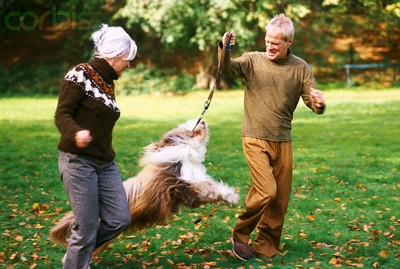
Thursday Apr 8th - 2010
Walking a dog has potentially greater health benefits as a buffer against stress in senior citizens than walking without a dog.

As Australia’s over-65 population increases, there is growing interest in supporting older people to continue as active and healthy members of society. According to the latest research, pet ownership is an important part of doing just that. Walking a dog has potentially greater health benefits as a buffer against stress in senior citizens than walking without a dog according to a report published in the Medical Journal of Australia in January 2006. These latest benefits of dog ownership among older people are not surprising according to Associate Professor Eleonora Gullone, from Psychologists for the Promotion of Animal Welfare.
“Owning a pet has clearly been shown to have health and well-being benefits for the general population and for older people it is shown to have specific positive benefits." Studies of the elderly have shown that older pet owners visit the doctor less often and take less medication than non-pet owners.
In fact, a landmark study published in the Medical Journal of Australia in 1992 showed that pet owners had significantly lower risk factors for cardiovascular disease than did non-owners,” says Dr Gullone. “Pets can also help the elderly feel they are a part of the social fabric. Caring for a dog involves taking it for a walk. This is thought to be the reason that older people who have contact with a pet are less likely to report feeling lonely and are less likely to visit their doctor.”
Figures from the Australian Bureau of Statistics show that more than 13 per cent of Australians were aged 65 years and over at 30 June 2005 and the median age of Australians is steadily increasing. Dr Gullone notes that some elderly people feel concerned about whether they will be able to continue to care for their pet as they get older. “There are now innovative programs, such as the Pet Companion Program run by Knox Community Volunteers, which support older people and people with a disability in caring for their pets including co-ordinating vet visits, bathing, grooming and walking dogs.
This can be of great benefit for someone who is concerned about their ability to manage a pet. Australia is a nation of pet lovers. It is estimated that 64% of the 7.5 million households in Australia have some type of pet and 52% of these households own either a dog or a cat.
Over many years, Australian and international research has shown that owning pets can help improve a person’s mental and physical health; reduce the effects of stress; help children learn about responsibility; facilitate social interaction between people, and build a sense of community.
“It also seems that some of the accommodation options that are specifically designed for older people are acknowledging the importance of companion animals either by having a resident pet or encouraging visiting pet programs. It is clear that our pets create significant medical, social, and psychological benefits and for many people, pet ownership is a relationship that they want to continue throughout their life,” says Dr Gullone.
http://www.forpeaceofmind.com.au/vol9/special_features/pets_for_Life.cfm
 | 2012/4 (1) | 2010/9 (2) | 2010/4 (3) |
| 2012/4 (1) | 2010/9 (2) | 2010/4 (3) |


